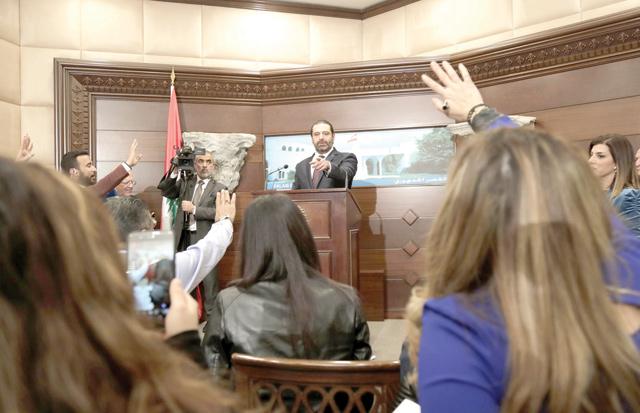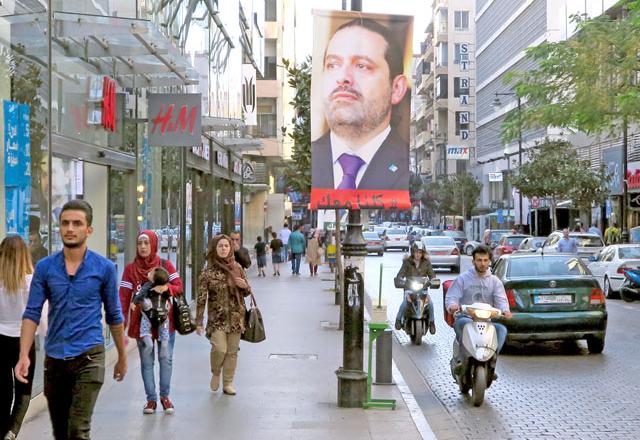You are here
Hariri: Lebanese prime minister’s political profile
By Reuters - Jan 31,2019 - Last updated at Jan 31,2019

Lebanese Prime Minister Saad Hariri (centre) addresses the media after announcing the new Cabinet during a press conference at the presidential palace in Baabda, east of the capital Beirut, on Thursday (AFP photo)
BEIRUT — Sunni politician Saad Al Hariri formed his third Lebanese government on Thursday after rival factions agreed a national unity Cabinet, nearly nine months since an election.
Below are some key phases in his political career:
* Hariri, 48, has been Lebanon's leading Sunni since the 2005 assassination of his father, Rafik. The early years of his political career were defined by his close alliance with Saudi Arabia and confrontations with Lebanese allies of Syria and Iran, chief among them the heavily armed Shiite group Hizbollah.
A UN-backed court has charged five Hizbollah members over his father's killing. They have been tried in absentia by the UN-backed tribunal at The Hague. The group denies any role. Hariri has said he is not seeking revenge for the killing.
* He formed his first coalition government in 2009 after the anti-Syria and anti-Hizbollah coalition he led at the time won a parliamentary majority with Saudi backing. That "March 14" alliance gradually disintegrated in the years that followed.
His Cabinet was toppled in early 2011 when Hizbollah and its allies quit over tensions linked to the Hariri tribunal. In the following years, Hariri mostly stayed outside Lebanon on security grounds.
As the war in Syria escalated, Lebanon became paralysed by tensions linked to the conflict. Hariri spoke out against Hizbollah's role fighting in support of President Bashar Assad. Political deadlock meant the presidency fell vacant when Michel Suleiman's term ended in 2014.
* In 2016, Hariri stunned Lebanon with a proposal that would see him return as prime minister and deliver the presidency to Maronite politician Suleiman Franjieh, a Hizbollah ally and a close friend of Assad. The idea failed to gain traction as Hizbollah stuck by another of its Christian allies, Michel Aoun, as its candidate for the presidency.
* Later in 2016, Hariri struck a deal with Aoun's party that resulted in him becoming prime minister for a second time and delivered the presidency to Aoun. Hariri formed his second coalition government. He remained an opponent of Hizbollah but his focus was largely on Lebanon's economic problems.
Anti-Hizbollah hawks have accused him of compromising with the Shiite group and abandoning the original principles of "March 14".
* Hariri's ties with Saudi Arabia have suffered in recent years, hitting a low in November 2017 when it is widely acknowledged that Riyadh forced him to resign and held him in the kingdom. Saudi Arabia and Hariri publicly deny this version of events, though French President Emmanuel Macron confirmed at the time that Hariri was being held in Saudi Arabia.
After French intervention, Hariri returned to Beirut and retracted his resignation, with the Lebanese government reiterating its policy of neutrality in regional conflicts. This mainly aimed to address Saudi concerns about Hizbollah's support for the Houthi rebels in Yemen.
Hariri remains a focal point for Western support. In April, France hosted an international conference where donors pledged more than $11 billion in assistance on condition Lebanon carried out long-delayed economic reforms.
* Hariri's Future Movement lost more than a third of its seats in the 2018 parliamentary election, some of them to Hizbollah allies. Hariri attributed this to a new election law that awarded seats on a proportional basis. He also blamed the shortcomings of Future and has sacked some top party officials.
* The collapse of Hariri's Saudi-based construction firm Saudi Oger has weighed on the finances of his political network in Lebanon in recent years. Saudi Oger was the source of much of the wealth that helped establish the Hariris as Lebanon's leading Sunni family after the 1975-90 civil war.
Related Articles
BEIRUT — The Lebanese Shiit Muslim group Hizbollah will not give way in a dispute over Sunni Muslim representation in a new unity government
BEIRUT — Prime Minister SaadHariri said on Thursday Lebanon's political crisis was "a wake-up call" for Lebanese with different loyalties to
BEIRUT — Lebanon's president on Wednesday accused Saudi Arabia of holding hostage Prime Minister Saad Al Hariri along with his family — the

Opinion
Apr 09, 2025
Apr 08, 2025
- Popular
- Rated
- Commented
Apr 08, 2025
Apr 09, 2025
Newsletter
Get top stories and blog posts emailed to you each day.















